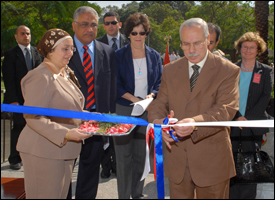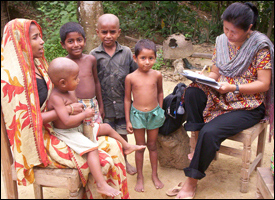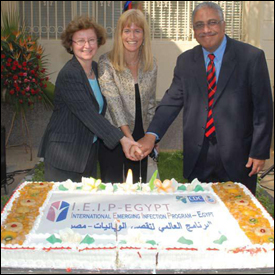CDC Expands Emerging Infections Collaboration Abroad
Published: April 21, 2009

Nasr El-Sayed, MD, MPH, assistant to the minister of health, cuts the ribbon at the new IEIP facility in Cairo, while Yasmin Shakhawy, administrative assistant for IEIP Egypt; Mohamed Abukela, MD, Ministry of Health and Population's executive director for IEIP Egypt; Margaret Scobey, MD, US ambassador to the Arab Republic of Egypt; and NCPDCID Director Rima Khabbaz, MD, look on.
The Centers for Disease Control and Prevention's (CDC) International Emerging Infections Program (IEIP) has expanded its collaborations and improved IEIP sites and facilities in several countries overseas as part of its continuing effort to help public health officials address emerging global health issues.
IEIP is a core component of CDC's Global Disease Detection Program, the agency's principal and most visible program for developing and strengthening global capacity to identify and rapidly and effectively respond to emerging infections around the world.
In the past several months, CDC officially established an IEIP project in Bangladesh and opened a new, larger facility (IEIP Egypt) in Cairo to facilitate collaborations between the Egyptian Ministry of Health and Population, CDC, and the US Naval Medical Research Unit No. 3 (NAMRU-3). IEIP is part of the Division of Emerging Infections and Surveillance Services in the National Center for Preparedness, Detection and Control of Infectious Diseases (NCPDCID).
"IEIP projects are strategically located sites in Central America, Africa and Asia where CDC staff provide technical assistance and partner with local health experts," said IEIP Global Activities team lead Sonja Olsen, PhD. "The sites integrate disease surveillance, applied research, prevention, control, and training activities to address country- and region-specific infectious disease threats."
Six IEIPs Worldwide
Although CDC has worked in Bangladesh since 1963, CDC recently formalized its partnership with the International Centre for Diarrhoeal Disease Research, Bangladesh (ICDDR, B), which is located in the capital city of Dhaka. The move makes Bangladesh the sixth IEIP worldwide; others are components of GDD Regional Centers in China, Egypt, Guatemala, Kenya and Thailand.

A public health worker collects data on diarrhea and respiratory disease in the Bandarban region of Bangladesh. The activity is part of a multi-agency program that is among the largest intensive handwashing, hygiene/sanitation and water quality improvement programs efforts ever attempted in a developing country. In the first stage, the intervention is targeting 19.6 million people in rural Bangladesh. The Bangladesh IEIP is conducting surveillance for diarrhea, respiratory disease, and mortality in intervention and control communities to assess the impact of the intervention.
Headed by Stephen Luby, MD, the Bangladesh IEIP will support a broad collaboration between Bangladeshi scientists and CDC staff. "The establishment of an IEIP here in Bangladesh will make it easier for CDC programs to collaborate in Bangladesh, and it's also a sign to the leadership at ICDDR, B and the government of Bangladesh that CDC values the relationship we have," Luby said. "We look forward to continuing to support a broad collaboration between CDC and ICDDR, B."
One key focus area of the Bangladesh IEIP is gaining a better understanding of the causes of severe respiratory disease in that country and learning what steps can be taken to prevent transmission of these diseases.
CDC also has a long-standing relationship with NAMRU-3 and the Egyptian Ministry of Health and Population. In 2006, CDC formally launched IEIP as part of the GDD Regional Center hosted by NAMRU-3 in Egypt. The collaboration recently expanded with the opening of a new facility in October 2008. After more than a year of renovations, IEIP Egypt relocated to the former Abbassia Fever Hospital in Cairo. Originally built in the 1890s, the hospital today houses 1,500 beds and is the largest in Egypt. Its proximity to the US Navy's research center next door increases opportunities for collaboration among CDC, Egyptian, and Navy scientists.
The new facility, staffed by eight personnel from the Egyptian Ministry of Health and Population, can house more than 20, and will provide room for trainings by IEIP staff and other GDD components, such as the Field Epidemiology Training Program. The office is outfitted with state-of-the-art computer equipment and data analysis software.
"The opening of this new facility is the culmination of a partnership that started several years ago with Egypt and NAMRU-3," said NCPDCID Director Rima Khabbaz, MD, who attended the official opening of the new facility along with Nasr El-Sayed, MD, the Egyptian Minister's assistant for primary health care, preventive medicine and family planning, and US Ambassador Margaret Scobey. "We are very proud of the program, and it will be a model for others. We're working collaboratively to bring together the best science to address infectious diseases of national and regional importance."
Work Site for Epidemiologists

Khabbaz, Erica Dueger, PhD, DVM, CDC/NAMRU-3's director for IEIP Egypt, and Abukela cut the cake at the IEIP Egypt opening celebration.
The IEIP Egypt headquarters will serve as a common work site for epidemiologists, laboratory scientists, and data managers from the Egyptian Ministry of Health and Population, CDC, and NAMRU-3. Staff will collaborate to monitor infectious disease trends, investigate disease outbreaks, identify new risk factors for infectious disease, and develop culturally appropriate disease control methods.
Among the recent projects of IEIP Egypt are:
- A pilot project to train district-level epidemiologists.
- A study on the effectiveness of education and increased handwashing in decreasing flu among 36,000 elementary school children in Cairo.
- The establishment of population-based surveillance for acute respiratory disease, diarrhea, acute febrile illness, and acute infectious neurological disease in the Damanhour.
District of the Delta Region of Egypt. IEIP staff recently conducted a health utilization survey of more than 3,000 households to support this effort.
In addition to its work in Egypt, the Cairo-based IEIP works broadly in the region with NAMRU-3. A core IEIP staff of 36 (epidemiologists, data management, laboratorians, and support staff) and more than 30 field staff facilitate ongoing projects and training in Afghanistan, Azerbaijan, Djibouti, Egypt, Georgia, Ghana, Iraq, Jordan, Libya, Morocco and Oman.

